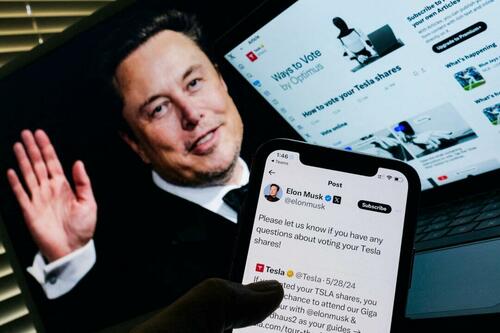Court Denies Class Action Status For Lawsuit Against Twitter
Authored by Naveen Athrappully via The Epoch Times (emphasis ours),
A California court dismissed class action certification for a lawsuit filed by a former employee that accused Twitter of not paying laid off workers bonuses that were allegedly promised.
Mark Schobinger, the plaintiff, was Twitter’s senior director of compensation during 2022–23, a time when the company was in the process of being acquired by Elon Musk, according to an Oct. 16 order issued by the U.S. District Court, Northern District of California.
At the time, Schobinger was a member of a group of employees eligible to receive annual bonuses in early 2023. However, the company was under no obligation to pay, a fact that is “undisputed” under the terms of the bonus, the order noted. Paying the bonus was “a matter of discretion” for the firm.
Schobinger alleged that the company promised employees in April, May, and August of 2022 that it would pay the bonus provided the workers stayed with the firm throughout the acquisition. The plaintiff claimed he did stay during this phase because of the promise. He filed the lawsuit after not getting paid, and sought class certification.
On Wednesday, U.S. District Judge Vince Chhabria denied Schobinger’s motion, noting he is unfit to act as a class representative.
The judge pointed out that the plaintiff had argued against Twitter paying the bonus while he was under employment with the firm.
In November 2022, months after Twitter’s bonus promise, Schobinger sent a message to the company’s “Head of People Experience,” stating that whether to pay the bonus was purely dependent on the “discretion” of Musk. Schobinger also wrote that he recommended not to pay the bonus.
In February 2023, the plaintiff sent a “white paper” to several executives on the issue, stating that “not paying a bonus would be prudent.” Evidence also points to Schobinger telling Musk in a meeting a month earlier that the firm need not pay the bonus, the order stated.
These statements make Schobinger “not an adequate class representative,” Chhabria wrote.
“At his deposition, Schobinger offered a convoluted explanation for how he could possibly have believed he was entitled to the bonus while simultaneously advocating that the company not pay it. It seems likely that Schobinger’s explanation is untrue,” the judge said.
“But even if he is telling the truth, that’s beside the point for purposes of this motion. Because even if he is telling the truth, his conduct makes him the worst possible candidate to serve as a litigation representative for the other Twitter employees who didn’t get a bonus.”
The court also highlighted a major issue with the motion—a “large number” of proposed class members signed arbitration agreements with Twitter, some of which also waived off class action lawsuits against the company.
Based on these observations, the judge denied the motion.
Employee Lawsuits
Twitter faces multiple lawsuits related to employee layoffs. After Musk took over Twitter in 2022, the company cut down its workforce.
In August, U.S. District Judge Araceli Martínez-Olguin dismissed a lawsuit brought by former employees with disabilities who were fired after the takeover.
Dmitry Borodaenko, an ex-employee, argued that the terminations violated Americans with Disabilities Act as the layoffs treated disabled people differently.
After Musk’s acquisition, the firm reversed work-from-home policies and said that employees who remained with the company would have to work for long hours, according to the complaint.
Martínez-Olguin pointed out that the plaintiff did not back his claims with proof. “Borodaenko fails to show how employees with disabilities were treated differently by Twitter’s broad return-to-the-office policy and increased workload,” the judge wrote in her ruling.
“Borodaenko’s theory improperly relies on the assumption that all employees with disabilities necessarily required remote work as a reasonable accommodation.”
In July, a California judge sided with Twitter in another case related to mass firing of staff members. The plaintiffs sought at least $500 million as severance pay for around 6,000 terminated workers.
The lawsuit alleged that Twitter promised a favorable severance plan that resulted in the employees staying longer at the firm than they would have. When they were let go, they received less severance pay than expected, it said.
The judge in the case noted that after Musk took over, Twitter notified staff members that they would get lower severance payouts when laid off, thus dismissing the complaint.
Tyler Durden
Mon, 10/21/2024 – 06:55
via ZeroHedge News https://ift.tt/IkZuFOX Tyler Durden
